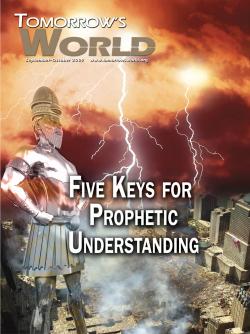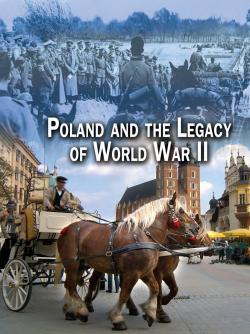Lest We Forget...
How will wars end and be replaced by peace? When Britain's last surviving World War I soldier died last July, what else died with him? Has the world learned the lessons of war—and will it ever learn the lessons of peace? Your Bible has the answer!
Private Harry Patch was the oldest man in the U.K. when he died at age 111 on July 24, 2009. More than that, he was Britain's last surviving soldier who had endured the horrors of trench warfare during World War I.
You might not know who he was, but his death was significant, especially in the United Kingdom. The Queen and an entire nation mourned his death. Prince Charles, Prime Minister Gordon Brown and many others paid tribute to Harry as a preeminent example of the sacrifice, courage, fortitude and sense of duty that characterized his generation in pursuit of freedom and liberty. Many went on to highlight the importance of sacrifice, in defending the lasting values and freedoms epitomized by Private Patch and many like him during the war years.
Harry was a teenage "Tommy" in WWI and served in the British army in the trenches of northern France. With his death at age 111, The U.K.'s last surviving connection with the First World War has ended. That is really rather important. It means there is no one left who can describe firsthand through personal experience what really took place—what it was really like, what we might learn from it all.
For most of his life, Harry determined that he would never discuss what he had experienced during the war. Yet at age 100 he was persuaded to end that silence—and he became a vocal and iconic spokesman on the futility of war. He used his celebrity status to encourage gratitude and respect for those who served on all sides in the conduct of war. But he was most passionate in pleading for disputes to be settled by means other than violence and war.
A Century of War
Around the time of the First World War, the nature of war itself was dramatically changing. Technological and scientific advancements were ensuring that the killing of fellow human beings could be prosecuted on a truly industrial scale. In his first speech as a Member of Parliament in 1901, a 26-year-old Winston Churchill, fresh from his experiences of war in South Africa, warned of this trend: "We must not regard war with a Modern Power as a kind of game in which we may take a hand, and with good luck and good management may play adroitly for an evening and come safe home with our winnings."
Churchill presciently described the wars he saw coming over the horizon. "A European war cannot be anything but a cruel heartrending struggle, which, if we are ever to enjoy the bitter fruits of victory, must demand perhaps for several years, the whole manhood of the nation, the entire suspension of peaceful industries, and the concentrating to one end of every vital energy in the community" (A History of the Twentieth Century, Vol. 1 by Martin Gilbert, p. 51). Churchill saw war, even miniature ones in the guise of minor conflicts, as hideous and appalling. Who could have foreseen that just 13 years hence the entire world would be plunged into a vicious and bloody conflagration that would cost millions of lives?
But this "war to end all wars" as it became known, failed to end war! In time we renamed it World War I—because another even more horrific world war would soon follow. The flower of an entire generation had been lost in the killing fields of northern Europe. Yet the revulsion felt by so many towards the sheer horror and tragic waste of human life did not end war. As a young diplomat observed to President Woodrow Wilson, recognizing the disastrous consequence of war reparations set in 1919 by the Paris Peace Conference at Versailles, "Our government has consented now to deliver the suffering peoples of the world to new oppressions, subjections and dismemberments—a new century of war" (The Great Influenza, by John M. Barry, p. 388, emphasis ours).
Was it really that much of a surprise that the 20th century turned out just as predicted? It began with war and it ended with war. "No year passed without soldiers and civilians being killed in war, or struggling to recover from its ravages" (Gilbert, p. 2). Why should the 21st century be any different? Has mankind perhaps finally learned the lessons of war, as Harry Patch wanted—to resolve our differences some other way than by violence? Or is the timeless wisdom found in the Bible, in commenting on human nature, perhaps more accurate: "Their feet are swift to shed blood; destruction and misery are in their ways; and the way of peace they have not known. There is no fear of God before their eyes" (Romans 3:15–18). There is something profoundly deficient revealed by the violent proclivities of human nature. Could it be connected with a disregard and neglect of the thinking and ways of God?
Why Remember the Past?
Why is the death of a man like Harry Patch of such importance? When the last living connection with events in the past is severed, something irrevocable is lost. Inevitably, memories fade and with them the reality of those past events. It is left to the historians to chronicle such events. As a result, theirs is an important and vital role.
The job of historians is to accurately assemble the facts and reflect upon the meaning of past events so future generations can remember. But the problem is that we live in a generation that lives almost entirely in the delights, pleasures and preoccupations of the present, and is largely unconcerned about the past. Consider this perspective from one such famous historian, Eric Hobsbawm: "The destruction of the past… is one of the most characteristic and eerie phenomena of the late twentieth century. Most young men and women at the century's end grow up in a sort of permanent present lacking any organic relation to the public past of the times they live in. This makes historians, whose business is to remember what others forget, more essential at the end of the second millennium than ever before" (Age of Extremes, p. 3).
Today, there is a kind of collective amnesia of the present generation that is truly discouraging and deeply concerning. After all, as the US, Spanish-born philosopher, George Santayana, observed, "Those who cannot remember the past are condemned to repeat it" (The Life Of Reason, vol. 1). If we do not confront and deal with the violent proclivities of human nature, then we are doomed. Especially in a world where the destructive potential of war seems to increase exponentially.
We must never forget the futility and destructiveness of war or the lessons we should learn from it. As an example, consider the Nazi holocaust of the Second World War. Some debate whether such a monumental horror could ever be repeated. Others, appallingly, now deny it ever took place. It was so terrible, so dreadful, and so utterly unimaginable that it has scarred entire generations that came afterward. For some, it has become easier and more convenient to forget, and to convince themselves that it never happened.
Sometimes a nation finds itself so troubled by its own past that its leaders erase history even from school lessons, in favor of stories more palatable. Ask a typical Japanese schoolchild and a typical Chinese schoolchild about Japan's 1931 invasion of Manchuria, and you will hear two very different "historical" accounts of what transpired.
This is one reason why General Dwight D. Eisenhower, commander-in-chief of Allied forces during WWII, insisted that the horror of the Nazi death camps be filmed in great detail for future generations. Germany, and German-occupied Poland, had been the site of atrocities hard for many to believe. Seventy years after Germany invaded Poland, marking the start of World War II (see "Poland and the Legacy of World War II" on page 22 of this issue), the shattering effect of those years still lingers.
Well-aware of the human capacity for denial, Eisenhower insisted that residents of the surrounding towns and cities be brought to the death camps, to smell the stench and see for themselves the shocking reality of what the Nazi regime had perpetrated. Had he not done so, many would have remained unaware of the truth. Eisenhower appreciated that future generations might be tempted to blot out of their collective memories the sheer unfathomable horror of it all. And so it has been. Eisenhower was determined to do his part never to let that happen.
One of the lessons of war enshrined in the passing of Harry Patch is that we should take the time to learn about the events of history so we never forget and never deny what took place—whether out of horror, revulsion—or any other reason!
More Than a History Book!
Which brings us to the history book par excellence—already referred to—the Holy Bible. Unlike other books of history, its authority, its scope, depth and range of experience and advice is unprecedented. Why do so many people pay such little attention to it today? In an increasingly Godless age, it has become fashionable to ignore and even to forget what God's word has to say.
But the Bible presents us with much more than history. It claims to be inspired directly by God—God-breathed (2 Timothy 3:16)—and profitable in every way. It is God's timeless message of wisdom to mankind across the entire panoply of human experience. Its message is invaluable. We should relearn its importance and pay more attention to its message.
For example, while we are on the subject of war, it provides us with a simple understanding of the causes of war: "Where do wars and fights come from among you? Do they not come from your desires for pleasure that war in your members? You lust and do not have. You murder and covet and cannot obtain. You fight and war. Yet you do not have because you do not ask. You ask and do not receive, because you ask amiss, that you may spend it on your pleasures" (James 4:1–3).
We cannot escape this observation that war and violence are integral to selfish human nature, which all-too-often resorts to some form of violence to get what it wants. At the same time we refuse to countenance the commandments and priorities of a loving God, who commands that we not resolve our differences through violence. "Repay no one evil for evil… live peaceably with all men… do not avenge yourselves, but rather give place to wrath; for it is written, 'Vengeance is Mine, I will repay,' says the Lord… Do not be overcome by evil, but overcome evil with good" (Romans 12:17–21).
Many of us apply this advice, as best as we can, in our close personal relationships. The greater challenge is to find ways to apply this advice to all our other relationships as well. How can these principles be applied to prevent nation rising up against nation—even to preventing conflict that could bring our entire civilization to its knees—or worse?
As Harry Patch felt so strongly, there has to be another way. And there is—if we are willing to live our lives in harmony with what God asks of us.
But there is yet more. Remarkably, the Bible also records what we might call history in advance. It is called prophecy—God's predictive eye view of the future. God sets out in the Bible an outline of the way world events will transpire. It is not a pretty picture. The Bible chronicles the end result of human nature—a war to truly end all wars: "For then there will be great tribulation, such as has not been since the beginning of the world until this time, no, nor ever shall be. And unless those days were shortened, no flesh would be saved" (Matthew 24:21–22).
Christ's words ultimately refer to a time of trouble that will transcend in awfulness the destructive madness of the world wars that characterized and so disfigured the 20th century. And because He spoke those words for our edification, we should recognize them—despite the horror they portend—as reliable and true—unless we as individuals and nations can learn the lesson of war. Scripture explains what we will face, unless we can change the human nature that is so hostile to God and His revealed way—and which is the underlying cause of war (Romans 8:7; Jeremiah 17:9).
If we have eyes to see, God makes absolutely clear for us the way that human nature can, and must—and, in time, will—change!
Part of God's commission to His Church is to warn our generation of what He calls the coming Great Tribulation, the war that will end this present age of man and lead to the better age of the Kingdom of God. The Tomorrow's World magazine is being published as part of the effort to carry out that commission to get out this message to every corner of the globe.
Peace Is Coming!
True peace is coming to this war-torn and war-weary world. The returning Jesus Christ is coming to put an end to wars. His prophesied reign over the entire earth will bring lasting and universal peace, such as our world has never before experienced. Under Jesus Christ's direction, humankind will learn to think differently. Human nature that does not know the way to peace will at last be brought face-to-face with God's way of thinking that will ensure peace. Bible prophecy shows that this wonderful time will come in the not-too-distant future (for more on Bible prophecy and how you can understand it, please read "Five Keys for Prophetic Understanding" on page 10 of this issue).
What will this wonderful time be like? Those Christians whom God is calling today will have a special part to play in assisting Jesus Christ in ruling the earth. To learn more about this glorious future, please write for your free copy of our inspiring booklet, The World Ahead: What Will It Be Like?
As we see from the life of Harry Patch, it is important to learn and remember the course of history past, by listening to those who are still alive—whose experience lives on with them. When they have gone, we can continue to learn from the history books that continue to faithfully chronicle the past. And we can especially learn from the richness and depth of the Bible the larger lessons that history teaches.
But you and I can go one better—we can know the course of future history from the Bible. It is God's gift to you. So you can learn. So you can change. So you can escape the devastation of coming wars. So you can learn to play your full part in helping to end wars permanently.
So, we encourage you to dust off your Bible and begin to draw on the timeless wisdom it contains. Keep digging into the plethora of biblical information provided in this magazine, on the Tomorrow's World telecast and at the www.tomorrowsworld.org Web site, and apply the principles you learn in your daily life.
We should remember men like Harry Patch and what they represent. Remember the past and learn from it. Do not bury yourself in the selfish pleasures of the present (2 Timothy 3:1–5). Even more, learn what the future holds for you and this world. And take action! Today!






